Crohn’s disease can be overwhelming. It isn’t just the bowel urgency or returning pain; in fact, Crohn’s disease interferes with all aspects of your life, from missing work to avoiding social contacts to dodge embarrassing situations involving you and the toilet.
CBD possesses certain qualities that can offer benefits to some of the pesky symptoms of Crohn’s disease and other inflammatory bowel diseases (IBD).
Not only does CBD work as an anti-inflammatory, but it can also dampen pain and have a positive impact on your gut microbiome.
In this article, we cover current research and understanding of using CBD oil for Crohn’s disease. We’ve also prepared product recommendations for those who are just getting started with CBD and are looking for high-quality oils.
Key Highlights: Using CBD Oil for Crohn’s Disease
CBD acts on many of the neurotransmitters involved in regulating inflammation. When you take CBD extracts such as oil, the active ingredients start acting on cannabinoid receptors within the endocannabinoid system.
Speaking of which, the endocannabinoid system — abbreviated to ECS — is a large network of receptors found throughout the body, involved in regulating inflammation and peristalsis (gut movements). It also regulates stress responses in the brain (1).
With regards to Crohn’s disease, CBD has demonstrated the following qualities:
- Lowers the release of pro-inflammatory cells.
- Blocks key immune cell activity, breaking down the cycle of chronic inflammation and bowel sensitivity (2).
- Reduces pain by acting indirectly on opioid and vanilloid receptors — which may reduce pain signaling (3).
Best CBD Oils for Crohn’s Disease
1. Royal CBD (Editor’s Choice)
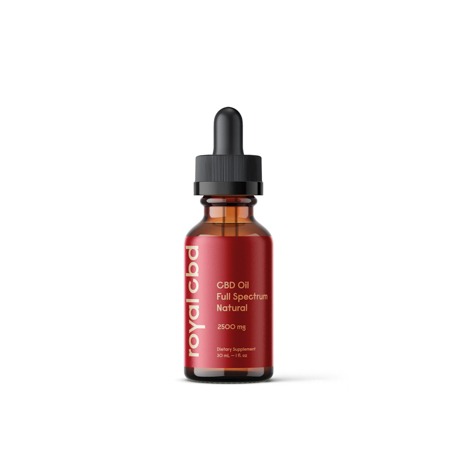 Product Details
Product Details
| Pros | Cons |
|
|
Why We Recommend Royal CBD Oil for Crohn’s Disease
Royal CBD is a premium U.S. company selling organic hemp CBD oils on top of other formats such as capsules, gummies, and topical products. The CBD in Royal CBD oil comes from domestic hemp plants and is gently extracted using supercritical CO2. The oil contains the full-spectrum of cannabinoids and terpenes, boosting the health benefits of CBD. If you’re looking for the best CBD products for Crohn’s disease, we recommend Royal CBD Oil 2500 mg and their high-strength capsules to cope with pain and inflammation. All of Royal CBD’s products are tested in an independent laboratory for potency and purity.
2. Gold Bee (Best Value)
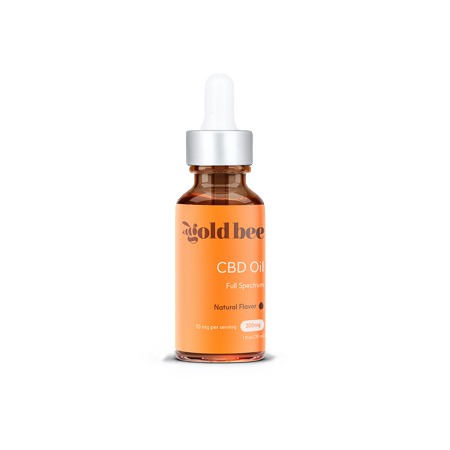
Product Details
| Pros | Cons |
|
|
Why We Recommend Gold Bee CBD Oil for Crohn’s Disease
Gold Bee makes the best CBD oils for Crohn’s disease if your daily dose doesn’t exceed 40 mg CBD daily. This company sells full-spectrum CBD oil in three flavors: natural, honey, and kiwi, with CBD concentration of up to 1,200 mg. These products are sourced from organic, pesticide-free hemp grown in Colorado and extracted with carbon dioxide to maintain the original chemical profile of hemp. You can also choose from CBD gummies and capsules.
3. CBDistillery (Good Price)
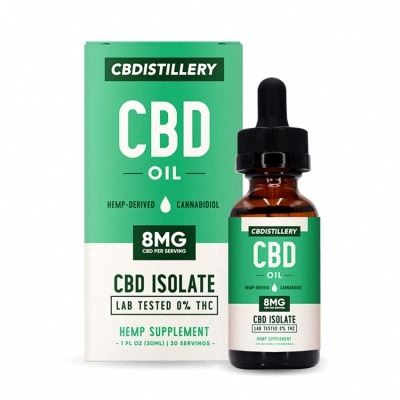
Product Details
| Pros | Cons |
|
|
About CBDistillery
CBDistillery is one of the pioneer brands in the market. This company offers the broadest selection of CBD formats among all the names listed in this ranking. The company sells CBD oil in two options — full-spectrum and broad-spectrum — but they also have capsules, gummies, isolate powders, and topical products. If you’re shopping for high-quality CBD with a tight budget, this company will be your best bet. Prices start at $20 per bottle (250 mg CBD).
4. CBDPure (Runner Up)
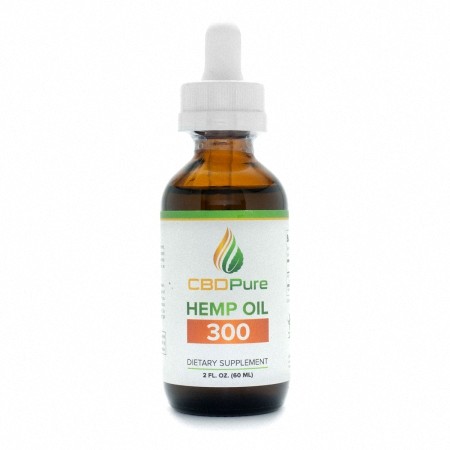
Product Details
| Pros | Cons |
|
|
About CBD Pure
CBD Pure has three types of CBD products in its line up: full-spectrum CBD oil, high-potency CBD capsules, and CBD-infused cream. All products can be used for Crohn’s disease and other IBD conditions. However, keep in mind that CBD Pure doesn’t have high-potency oils in its collection, so if you’re looking for a stronger product, you may find capsules more cost-efficient. The capsules contain 25 mg per piece. CBD Pure has Certificates of Analysis for all its products. The company also offers a 90-day money back guarantee program. If you decide CBD Pure’s products are not for you, you can return your order for a full refund.
5. Charlotte’s Web (Best Variety)
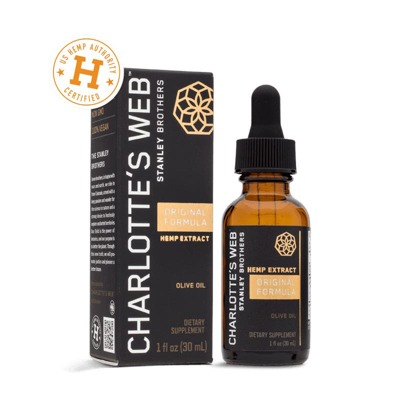
Product Details
| Pros | Cons |
|
|
About Charlotte’s Web
Charlotte’s Web is one of the biggest names on the market. The brand’s creators are the people who actually have fueled the CBD rush. They have introduced the anti-seizure properties of CBD oil to the mainstream media when their CBD oil helped a young girl named Charlotte Figi reduce their epilepsy attacks from several times a day to one mild attack a week. Charlotte’s Web offers olive oil-extracted full-spectrum CBD oil, CBD isolate, capsules, gummies, hemp-infused cooling gel, and CBD cream. Although the company has recently received a warning from the FDA about making health claims regarding CBD and mangling the CBD content of their topicals, they still have lots of positive reviews from users who claim their products have drastically improved their quality of life.
Charlotte’s Web also has batch-specific Certificates of Analysis.
Understanding Crohn’s Disease
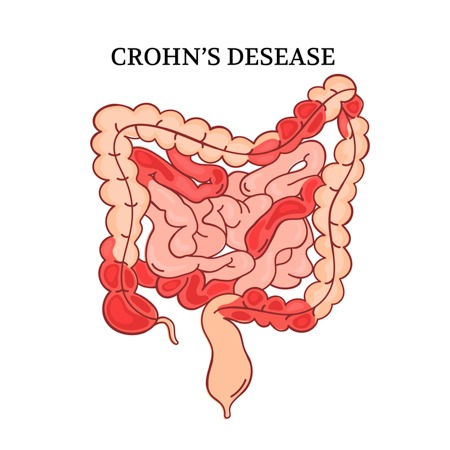
Crohn’s disease is a medical condition involving inflammation of the digestive tract. This disease falls into the category of inflammatory bowel diseases (IBD) along with ulcerative colitis.
Common symptoms of Crohn’s disease include:
- Deep inflammation
- Severe pain in the digestive tract
- Diarrhea/constipation
- Weight loss or gain
- Headaches
- Fatigue
- Autoimmune symptoms
The condition is often linked to a decreased quality of life and frequent complications requiring hospitalization. Severe cases of Crohn’s disease may call for surgical procedures.
Theoretically, Crohn’s disease is incurable, but there are several treatments available that may ease its symptoms and allow patients to function normally.
Why Many People Are Turning to CBD Oil for Crohn’s Disease
CBD (cannabidiol), is one of the two major active compounds in the cannabis plant. Unlike the second most well-known cannabinoid, THC, CBD won’t make you feel high because it doesn’t have a direct affinity with the cannabinoid receptors in the brain.
According to research, CBD has several therapeutic applications (4). Some experts claim that CBD often helps where conventional treatments fail — but does it help with Crohn’s disease?
A study conducted in 2011 found that CBD might reduce inflammation in the intestine of mice with ulcerative colitis, a milder type of IBD. They also reported that CBD lowered intestinal damage by bringing balance in the inflammatory environment created due to the disease (5).
Another study on rats with colitis has shown that a combination of CBD and THC was effective at reducing inflammatory markers in the subjects (6). THC is often used in conjunction with CBD to boost its therapeutic effects and provide a few health benefits on its own — but in quantities that don’t cause a strong high due to the presence of CBD.
The study further showed that the CBD/THC mix reduced the frequency and severity of IBD symptoms. Scientists concluded that CBD and THC enhanced their effects in alleviating the bowel inflammation in rodents.
Finally, a study in 2012 showed that topical administration of CBD to mice with colitis resulted in considerable improvement in the subjects’ symptoms. Meanwhile, mice in another group were given CBD orally, which resulted in the reduction of damage done to the bowel by IBD (7).
In addition, CBD can interact with a receptor known as GPR55, an important regulator of intestinal inflammation (8).
Researchers believe that the endocannabinoid system (ECS) is a potential therapeutic target for treating Crohn’s disease. They also believe that the compatibility of the ECS with plant-derived cannabinoids explains the potency of their therapeutic effects.
CBD Oil for Crohn’s Disease Symptoms

In this section, we break down the three main health benefits of using CBD oil for Crohn’s disease.
1. CBD Reduces Inflammation
Multiple studies have shown CBD to curb inflammation involved in many different types of inflammatory conditions, such as IBD.
One of the mechanisms responsible for this effect is the way CBD affects the normal cycle of our cells. CBD binds to cell receptors known as the adenosine A2 receptors, which decides what molecules are produced and kept by cells around the body (9). The interaction between CBD and these receptors stops the cells from releasing molecules that can trigger and strengthen the inflammatory process. As a result, inflammation is halted at the source.
A second way CBD reduces inflammation in patients with Crohn’s disease is through its action on the CB1 receptors of the endocannabinoid system. CBD prevents specialized cells known as mast cells from releasing histamine — a potent inflammatory compound that triggers allergies (10).
2. CBD Supports the Gut Microbiome
Some studies suggest that CBD can also influence the health of the microbiome. Dysfunctions in the microbiome are believed to be one of the main reasons behind the development of Crohn’s disease and other inflammatory bowel diseases.
According to early research, the endocannabinoid system is involved in maintaining a healthy diversity of bacteria in the gut lining, although more studies are needed to fully understand this effect (11).
3. CBD and THC May Relieve Abdominal Pain
Similar to CBD, THC is a well-known muscle relaxant. It can be used to prevent muscles from contracting in the intestinal tract with IBD. This reduces abdominal pain and supports motility in the digestive tract — leading to less constipation, cramping, and satiety (12).
CBD also dampens pain by stopping certain neurons from firing.
The analgesic properties of CBD and THC can only manifest through their interaction with the endocannabinoid system. Since endocannabinoids work within their own systems and don’t interfere in other networks regulating pain, THC and CBD don’t have the same potential for abuse as morphine (13).
The Pros and Cons of CBD Oil for Crohn’s Disease
The Pros
- CBD, as well as other cannabinoids, interact with the ECS to exert their therapeutic actions, one of which involves bringing balance in the digestive tract.
- CBD is a potent anti-inflammatory, which can ease the symptoms of Crohn’s disease.
- According to one study, CBD may reduce abdominal pain and diarrhea, two common symptoms of IBD (14).
- CBD doesn’t have mind-altering properties, unlike THC.
- The Food and Drug Administration (FDA) supports scientifically-based research on CBD.
The Cons
- Most studies regarding Crohn’s disease were conducted on animal models. We need more human clinical trials on CBD for Crohn’s disease to confirm its efficacy.
- Some of the animal studies brought inconclusive results when it comes to CBD’s efficacy for IBD.
- The FDA doesn’t approve any health claims about cannabis products.
- Since the market is largely unregulated, many CBD products sold locally and online are either mislabeled or produced below the generally agreed quality standards. Some of them may also contain dangerous solvent residue or pesticides due to poor farming and aggressive extraction.
CBD Oil vs. Alternative Treatments for Crohn’s Disease: A Quick Comparison
CBD oil isn’t the only natural treatment for Crohn’s disease. People who take on the natural path to treat this condition often use herbal remedies, such as aloe vera juice, peppermint, and chamomile to ease the symptoms associated with IBD. Probiotics are another viable option that may help bring the balance in your gut microbiome.
Dietary and lifestyle changes are also said to successfully manage Crohn’s disease.
Today, CBD products are mixed with adjunctive ingredients like aloe vera, chamomile, peppermint, and other herbs to maximize the efficacy of the treatment. Some people also add probiotics to their CBD products to maintain a healthy intestinal tract.
Different Types of CBD Oil by Cannabinoid Spectrum
There’s an abundance of CBD products in different forms that people can consider useful for treating Crohn’s disease and other inflammatory bowel diseases.
Full-spectrum CBD is the most common format that contains all of the chemicals naturally occurring in the hemp plant, including trace amounts of THC. These products are usually sold as CBD drops, vape oils, creams, edibles, and capsules.
Under the 2018 Farm Bill, this type of CBD can only have 0.3% THC to be considered legal.
There are also broad-spectrum products, which are pretty much like the full-spectrum ones, except for THC. The psychoactive cannabinoid is removed to cater to users who do not wish to consume any THC in their CBD oil.
Last but not least, we have CBD isolates that contain pure cannabidiol. These products are obtained from hemp plants and further purified from all the other compounds.
We encourage you to seek medical advice from a doctor expert on cannabis before buying CBD. A consultation with a qualified physician will help you get the most out of your CBD oil treatment for Crohn’s disease.
Tips on Finding the Best CBD Oil for Crohn’s Disease
- Only purchase high-quality CBD products from reputable brands. Most legitimate companies grow their hemp or buy them from local organic farmers.
- Check product reviews before buying from an online store. If the CBD oil is sold in a physical store or dispensary, take a look at the store’s reviews and make sure that the place is allowed to sell cannabis products.
- Ask for a certificate of analysis (COA) for each CBD product you’re interested in. Compare the company’s claims with third-party lab reports from the certificate.
- Be aware of the legal status of CBD in the area where you’re going to buy and consume CBD oil for Crohn’s disease.
- Choose CO2-extracted CBD oil. CO2 extraction doesn’t require additional or solvents, yielding pure and safe products.
CBD Dosage: How Much Should I Take for Crohn’s Disease?
Finding the right dosage of CBD oil is an experimental process because CBD is a relatively new treatment for Crohn’s disease. Healthcare practitioners are still trying to figure out the dosage that would be both effective and safe for users. If you want to get an idea of how much CBD oil people generally take for Crohn’s disease, you can take a look at the dosages used in past studies to get a good point of reference.
One small study on CBD and inflammatory bowel diseases required its participants to take 50 mg of CBD oil twice a day, increasing the dose to up to 250 mg. The research team found that users who took CBD experienced noticeable clinical remission and improved quality of life.
In addition, the study showed that the participants did not report side effects after 10 weeks of treatment with CBD oil.
Other health experts recommend an initial dose of 40 mg — gradually increasing the amount from there (if needed).
As with all supplements, the best way to gauge the effective dosage is to start at the lowest dose and gradually increase it until you experience the desired effects.
How to Take CBD Oil for Crohn’s Disease

CBD products are available in various forms, each of them having different routes of administration. The following products can potentially alleviate the symptoms of Crohn’s disease:
- CBD oils and tinctures: these products are used sublingually (under the tongue). CBD oil provides relatively fast effects — within 15–30 minutes after application — that can last for up to 6 hours.
- CBD capsules and pills: Studies conducted on using oral products like capsules have shown improved quality of life in the human participants consuming the product on a daily basis. Since capsules need to pass through the digestive system in order to take effect, the onset is usually delayed by anywhere between 30 minutes and 2 hours. The effects can last up to 10 hours.
- CBD edibles: These products are available as gummies, chocolates, protein bars, or even lollipops. They are great for people who have trouble swallowing pills. Similar to CBD capsules, gummies take longer to kick in; the CBD from gummies is released gradually and thus produces longer-lasting effects.
Final Verdict: Is CBD Oil a Good Option for the Management of Crohn’s Disease?
Crohn’s disease affects more than 3 million Americans. It is characterized by the inflammation of the bowel, often involving abdominal pain, malnutrition, severe diarrhea, fatigue, and weight loss. This disease is often associated with a poor quality of life and regular complications that may result in hospitalization or surgery.
As of today, there is no cure for Crohn’s disease, but that doesn’t mean you can’t manage it effectively. In fact, you can use natural remedies such as CBD oil to reduce the symptoms and function normally throughout the day. According to scientific findings, CBD is a promising compound that can reduce pain, lower gut inflammation, and improve digestion in patients.
Keep in mind that most of the studies that we’ve covered in this article were performed on animals. There is no direct evidence that states “Yes, CBD is a viable option for Crohn’s disease.” Nevertheless, some doctors and health experts are positive about CBD’s influence on gut health and often recommend CBD as a complementary therapy.
Users interested in adding CBD oil in their routine should seek advice from their doctor before buying it.
Reference links:
- Sharkey, K. A., & Wiley, J. W. (2016). The Role of the Endocannabinoid System in the Brain-Gut Axis. Gastroenterology, 151(2), 252–266. doi:10.1053/j.gastro.2016.04.015
- De Filippis, D., Esposito, G., Cirillo, C., Cipriano, M., De Winter, B. Y., Scuderi, C., … Iuvone, T. (2011). Cannabidiol reduces intestinal inflammation through the control of neuroimmune axis. PloS one, 6(12), e28159. doi:10.1371/journal.pone.0028159
- Manzanares, J., Julian, M., & Carrascosa, A. (2006). Role of the cannabinoid system in pain control and therapeutic implications for the management of acute and chronic pain episodes. Current neuropharmacology, 4(3), 239–257.
- Crippa JA, Guimarães FS, Campos AC, Zuardi AW. Translational Investigation of the Therapeutic Potential of Cannabidiol (CBD): Toward a New Age. Front Immunol. 2018;9:2009. Published 2018 Sep 21. doi:10.3389/fimmu.2018.02009
- De Filippis D, Esposito G, Cirillo C, et al. Cannabidiol reduces intestinal inflammation through the control of neuroimmune axis. PLoS One. 2011;6(12):e28159. doi:10.1371/journal.pone.0028159
- Jamontt JM, Molleman A, Pertwee RG, Parsons ME. The effects of Delta-tetrahydrocannabinol and cannabidiol alone and in combination on damage, inflammation and in vitro motility disturbances in rat colitis. Br J Pharmacol. 2010;160(3):712-723. doi:10.1111/j.1476-5381.2010.00791.x
- Schicho R, Storr M. Topical and systemic cannabidiol improves trinitrobenzene sulfonic acid colitis in mice. Pharmacology. 2012;89(3-4):149-155. doi:10.1159/000336871
- Stančić A, Jandl K, Hasenöhrl C, et al. The GPR55 antagonist CID16020046 protects against intestinal inflammation. Neurogastroenterol Motil. 2015;27(10):1432-1445. doi:10.1111/nmo.12639
- Liou, G. I., Auchampach, J. A., Hillard, C. J., Zhu, G., Yousufzai, B., Mian, S., … & Khalifa, Y. (2008). Mediation of cannabidiol anti-inflammation in the retina by equilibrative nucleoside transporter and A2A adenosine receptor. Investigative ophthalmology & visual science, 49(12), 5526-5531.
- Samson, M. T., Small-Howard, A., Shimoda, L. M., Koblan-Huberson, M., Stokes, A. J., & Turner, H. (2003). Differential roles of CB1 and CB2 cannabinoid receptors in mast cells. The Journal of Immunology, 170(10), 4953-4962.
- DiPatrizio N. V. (2016). Endocannabinoids in the Gut. Cannabis and cannabinoid research, 1(1), 67–77. doi:10.1089/can.2016.0001
- Aviello, G., Romano, B., & Izzo, A. A. (2008). Cannabinoids and gastrointestinal motility: animal and human studies. Eur Rev Med Pharmacol Sci, 12(Suppl 1), 81-93.
- Manzanares, J., Julian, M. D., & Carrascosa, A. (2006). Role of the cannabinoid system in pain control and therapeutic implications for the management of acute and chronic pain episodes. Current neuropharmacology, 4(3), 239-257.
- Hasenoehrl C, Storr M, Schicho R. Cannabinoids for treating inflammatory bowel diseases: where are we and where do we go?. Expert Rev Gastroenterol Hepatol. 2017;11(4):329-337. doi:10.1080/17474124.2017.1292851.

